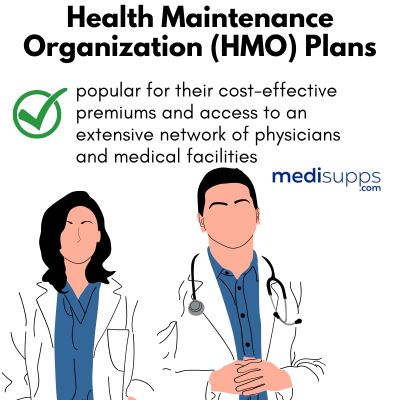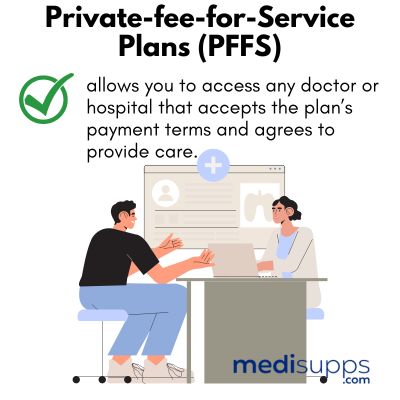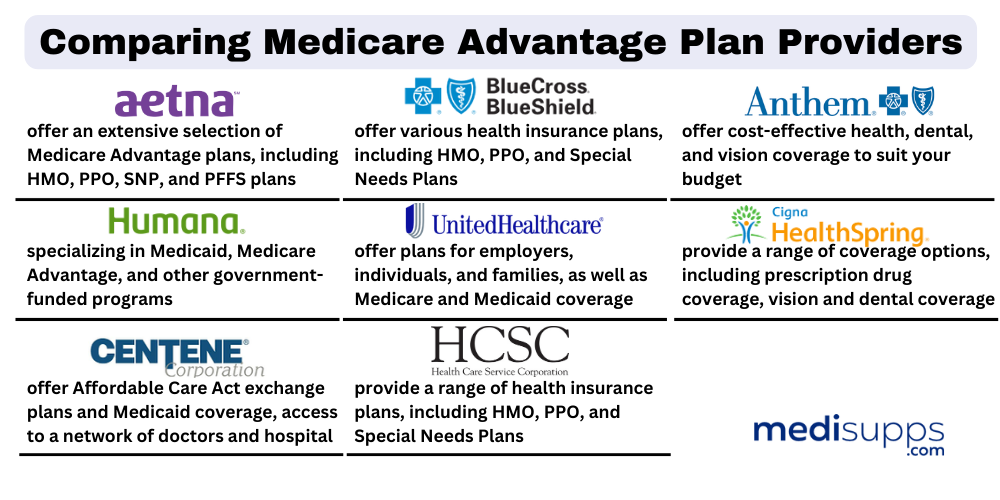
by Russell Noga | Updated December 18th, 2023
 While Medicare provides coverage in the form of Medicare Part A (hospital) and Medicare Part B (Doctor’s services), it doesn’t cover all your medical bills.. Medicare Advantage plans offer numerous benefits are one option you have to help.
While Medicare provides coverage in the form of Medicare Part A (hospital) and Medicare Part B (Doctor’s services), it doesn’t cover all your medical bills.. Medicare Advantage plans offer numerous benefits are one option you have to help.
With this comprehensive guide, we’ll help you explore the different types of Medicare Advantage plans, their additional benefits, and how to compare them, so you can confidently choose the right plan for you.
Key Takeaways
- Medicare Advantage Plans are comprehensive health insurance plans that offer additional benefits such as prescription drugs, dental, and vision care.
- It is important to consider factors such as costs, in-network providers, coverage for services, and medications when comparing Medicare Advantage plans.
- There are resources available to help choose the most suitable plan based on cost, coverage provider network ratings, and additional benefits.
What are Medicare Advantage Plans?
Medicare Advantage Plans, also known as Medicare Part C, are a type of health insurance offered by private companies that provide additional benefits beyond Original Medicare.
These plans incorporate Medicare Part A (hospital insurance) and Medicare Part B (medical insurance) coverage while offering other coverage perks, such as prescription drugs, dental, and vision care.

Some Medicare Advantage plans even offer the Part B premium giveback benefit, where the plan pays some or all of your Part B monthly premium through a credit on your Social Security check.
By opting for a Medicare Advantage plan, you gain access to an extensive range of services and benefits that Original Medicare doesn’t provide. This includes coverage for prescription drugs, dental and vision care, hearing care, and even gym memberships in some cases.
With many Medicare Advantage plans offering additional benefits at competitive prices, it’s essential to understand the various types available and how to compare them to make an informed decision.
Types of Medicare Advantage Plans
There are several types of Medicare Advantage plans available, each catering to different needs and preferences. These include:
- Health Maintenance Organization (HMO) Plans,
- Preferred Provider Organization (PPO) Plans,
- Special Needs Plans (SNPs),
- and Private Fee-for-Service (PFFS) plans.
Each plan type has its unique features, benefits, and limitations, which we’ll discuss in detail in the following subsections.
Health Maintenance Organization (HMO) Plans
 A Health Maintenance Organization (HMO) plan is a type of Medicare Advantage plan that requires you to select a primary care physician (PCP) from within the plan’s network of providers.
A Health Maintenance Organization (HMO) plan is a type of Medicare Advantage plan that requires you to select a primary care physician (PCP) from within the plan’s network of providers.
Your PCP plays a pivotal role in coordinating your care, ensuring you receive appropriate treatments, and referring you to specialists when necessary.
HMO plans are popular for their cost-effective premiums and access to an extensive network of physicians and medical facilities. However, it’s essential to note that you will be required to use the plan’s network of providers, except in cases of emergency care.
Preferred Provider Organization (PPO) Plans
 Preferred Provider Organization (PPO) plans offer greater flexibility compared to HMO plans
Preferred Provider Organization (PPO) plans offer greater flexibility compared to HMO plans
With a PPO plan, you can choose any provider that accepts Medicare without the need for a referral, although accessing out-of-network providers may come at a higher cost.
PPO plans generally have more affordable out-of-pocket costs and do not require you to select a primary care physician, giving you the freedom to consult specialists directly.
Anthem MediBlue PPO is an example of a Medicare Advantage PPO plan offered by Anthem.
Special Needs Plans (SNPs)
 Special Needs Plans (SNPs) are a specific type of Medicare Advantage plan. They are designed for individuals with medical conditions, low incomes, or who live in a nursing home.
Special Needs Plans (SNPs) are a specific type of Medicare Advantage plan. They are designed for individuals with medical conditions, low incomes, or who live in a nursing home.
These plans provide tailored benefits and services to meet the specific needs of the enrollee.
Dual Eligible Special Needs Plans, for instance, are available for individuals who qualify for both Medicare and Medicaid. Humana Special Needs Plans offer the Humana Healthy Options allowance, which assists eligible members in covering essential living expenses.
Private-fee-for-Service Plans (PFFS)
 Private Fee-for-Service (PFFS) plans are a type of Medicare Advantage plan that allows you to access any doctor or hospital that accepts the plan’s payment terms and agrees to provide care.
Private Fee-for-Service (PFFS) plans are a type of Medicare Advantage plan that allows you to access any doctor or hospital that accepts the plan’s payment terms and agrees to provide care.
With a PFFS plan, you don’t need to select a primary care physician or obtain referrals to see specialists.
The plan determines the amount they will pay to doctors, other healthcare providers, and hospitals, as well as the amount they must pay when receiving care.
PFFS plans may offer full or partial networks of providers, or in some cases, no network at all.
They may also provide additional benefits like prescription drug coverage, vision, and dental coverage.
Additional Benefits of Medicare Advantage Plans
Medicare Advantage plans are renowned for offering a wide range of additional benefits that Original Medicare doesn’t provide. Most Medicare Advantage plans include Part D prescription drug coverage, ensuring you have access to both generic and brand-name drugs, as well as coverage for over-the-counter medications.
Moreover, many Medicare Advantage plans provide coverage for dental, vision, and hearing care, allowing you to access routine check-ups, preventive care, and treatments without incurring extra costs.
Some plans, such as Anthem Medicare Advantage plans, go the extra mile by offering an over-the-counter (OTC) benefit, transportation to health-related appointments, meal delivery, a personal emergency response system (PERS), and 24/7 telehealth visits.
How to Compare Medicare Advantage Plans
When comparing Medicare Advantage plans, it’s crucial to consider factors like costs, in-network providers, coverage for services and medications, and the CMS star rating.
To compare in-network providers, you can examine the list of providers available in each plan and determine which ones are in-network.
Assessing coverage for services and medications involves considering what services and medications are covered and any applicable limits or restrictions.
The CMS star rating is a rating system that ranges from one to five stars, with five being the highest and one being the lowest, based on categories like quality of care and customer service.
Comparing Medicare Advantage Plan Providers
With numerous providers offering Medicare Advantage plans, it’s essential to compare them to find the right fit for your needs.
Some well-known providers include:
- Aetna,
- Humana
- Blue Cross Blue Shield (BCBS),
- United Healthcare,
- Anthem,
- Healthspring,
- Centene,
- and Health Services Corporation.
Each provider has its unique offerings and benefits, so it’s important to examine their plans thoroughly.
By using resources like Humana’s online tools, you can compare plan costs and coverage, check if drugs are covered, and see if your preferred doctors are in their network.
Aetna
Aetna is a health insurance company that has been in operation since 1853 and was acquired by CVS Health in 2018. Aetna Medicare Advantage plans in 2025 include HMO, PPO, SNP, and PFFS plans, catering to various needs and preferences.
Aetna also provides Medicare Supplement insurance plans in 2025 that help cover some of the out-of-pocket costs associated with Original Medicare, such as copayments, coinsurance, and deductibles.
In addition to Medicare plans, Aetna offers health insurance, dental, vision, and other plans for individuals, families, and employers.
Humana
Humana is a health insurance company specializing in Medicaid, Medicare Advantage, and other government-funded programs. Humana offers a range of Medicare Advantage plans for 2025, including HMO, PPO, SNP, and PFFS plans, ensuring you have various options to choose from.
Apart from Medicare Advantage plans, Humana provides dental insurance, vision insurance, and prescription drug coverage, making them a one-stop shop for all your healthcare needs. Humana Medicare Benefits in the Medicare Advantage plans for 2025 may offer additional benefits outside of Original Medicare Part A and Part B.
Blue Cross Blue Shield (BCBS)
Blue Cross Blue Shield (BCBS) is a consortium of healthcare providers that have pledged to provide coordinated care that meets established standards of quality and cost-effectiveness to manage healthcare costs. They offer various health insurance plans, including HMO, PPO, and Special Needs Plans, with each plan providing unique benefits and features.
BCBS plans to offer an extensive array of advantages, such as access to a vast network of providers, reduced out-of-pocket expenditures, and further coverage for services not included in Original Medicare. When comparing BCBS Medicare Advantage plans for 2025, it’s important to consider factors like provider networks, coverage options, cost-sharing, and additional benefits.
United Healthcare
United Healthcare is a health insurance provider that offers plans for employers, individuals, and families, as well as Medicare and Medicaid coverage. UnitedHealthcare Medicare Advantage plans in 2025 include HMO, PPO, SNP, and PFFS, catering to different needs and preferences.
United Healthcare places an emphasis on enhancing healthcare by granting access to excellent care, improving health outcomes, and diminishing costs.

Anthem
Anthem is a health insurance company that offers cost-effective health, dental, and vision coverage to suit your budget. As the largest for-profit managed healthcare company within the Blue Cross Blue Shield Association, they provide a range of health plans, including HMOs, PPOs, and Special Needs Plans.
Anthem also offers supplemental benefits such as prescription drug coverage, vision and dental coverage, and access to a network of providers. When comparing Anthem plans, it is essential to consider factors like premiums, deductibles, copayments, coinsurance, and out-of-pocket maximums, as well as the network of providers available and the additional benefits offered.
Healthspring
Healthspring is a Medicare Advantage plan administered through a health insurance company. They provide a range of coverage options, including prescription drug coverage, vision and dental coverage, and access to a network of doctors and hospitals.
Healthspring offers numerous advantages like reduced out-of-pocket expenses, access to an extensive network of physicians and hospitals, and additional services like vision and dental coverage. Enrollment in Healthspring can be completed through the Medicare website or by contacting their customer service line.
Centene
Centene is a publicly traded managed care company based in St. Louis, Missouri, specializing in providing healthcare services. They offer Affordable Care Act exchange plans and Medicaid coverage.
Centene is anticipated to complete its acquisition of Magellan Health by the end of this year, further expanding Centene Medicare Advantage plan offerings in 2025.
Healthcare Services Corporation
The Healthcare Services Corporation is a family of companies that operate the Blue Cross and Blue Shield plans in Illinois, Montana, New Mexico, Oklahoma, and Texas, making it the largest customer-owned health insurer in the United States. They provide a range of health insurance plans, including HMO, PPO, and Special Needs Plans, along with additional benefits like prescription drug coverage, vision and dental coverage, and more.
Healthcare Services Corporation offers competitive rates, a broad selection of plans, and access to a vast network of providers. To compare their plans, consider factors like cost, coverage, provider networks, and additional benefits, as well as compare plans from different providers to ensure the best value for your money.
Assessing Your Medicare Advantage Plan Needs
It’s essential to evaluate your personal needs when choosing a Medicare Advantage plan. Factors to consider include your current health, budget, lifestyle, and access to providers.
Understanding your specific requirements will help you select the most suitable plan among the various options like HMO, PPO, SNP, and PFFS plans.
Keep in mind that each plan has its unique features, benefits, and limitations, so it’s crucial to compare them thoroughly before making a decision.
Enrollment Periods and Switching Plans
 Enrolling in a Medicare Advantage plan or switching plans is only permissible during certain times and under specific conditions. Qualifying life events, such as marriage, divorce, relocation, or loss of other health coverage, may allow you to switch plans outside of the standard enrollment periods.
Enrolling in a Medicare Advantage plan or switching plans is only permissible during certain times and under specific conditions. Qualifying life events, such as marriage, divorce, relocation, or loss of other health coverage, may allow you to switch plans outside of the standard enrollment periods.
If you’re considering switching Medicare Advantage plans due to factors like new drugs not covered, improved dental coverage, or a premium increase without a corresponding coverage increase, be aware of the enrollment periods and plan switching protocols.
It’s also important to remember that you can only change plans during designated enrollment periods and special conditions that enable a plan change.
Local Medicare Advantage Plan Options
Understanding your local Medicare Advantage plan options is a crucial step in choosing the right plan for you. Your local area may offer various plan types, such as HMO, PPO, and PFFS plans, each with its distinct features and benefits. To find and compare local Medicare Advantage plan options, consider factors like cost, coverage, provider networks, and additional benefits.
Additionally, you can use resources like Medicare.gov to compare the ratings of different plans available in your area.
Getting Help Choosing a Medicare Advantage Plan
If you’re feeling overwhelmed by the process of choosing a Medicare Advantage plan, don’t worry – there are resources available to help. You can consult the plan itself, use a checklist to evaluate essential elements when assessing Medicare Advantage plans or speak with a licensed agent to guide you through the process.
Be sure to consider factors like:
- premiums,
- deductibles,
- copayments,
- coinsurance,
- out-of-pocket maximums,
- provider networks,
- and prescription drug coverage when comparing plans.
With the right information and support, you’ll be well-equipped to make an informed decision about the best Medicare Advantage plan for you.
Summary
In conclusion, understanding your Medicare Advantage plan options is crucial to making an informed decision that suits your healthcare needs.
With various types of plans like HMO, PPO, SNP, and PFFS plans, along with numerous providers like Aetna, Humana, BCBS, and United Healthcare, it’s essential to compare plans thoroughly. Consider factors like cost, coverage, provider networks, and additional benefits when evaluating your options.
Remember that there are resources available to help you through the process, and with the right information, you’ll be able to confidently choose the Medicare Advantage plan that’s right for you.
Frequently Asked Questions
What is the most widely accepted Medicare Advantage Plan?
AARP/UnitedHealthcare is the most popular and widely accepted Medicare Advantage plan, with 28% of all enrollment. However, there are many other popular companies such as Aetna, Humana, and Kaiser Medicare Advantage plans in 2025. The combination of its well-rated plans and affordable premiums, plus additional benefits, has attracted a large number of enrollees.
It is a trustworthy and dependable choice for Medicare Advantage coverage.
What is the difference between a Medicare plan and a Medicare Advantage Plan?
Medicare plans provide coverage for Part A (inpatient hospital and skilled nursing services) and Part B (doctor visits, outpatient services, and some preventive care) services. On the other hand, Medicare Advantage plans provide coverage for all Part A and Part B services as well as often including Part D (prescription drugs).
This means that Medicare Advantage plans offer more comprehensive coverage than regular Medicare plans.
Do you still pay for Medicare Part B when enrolled in a Medicare Advantage plan?
Yes, you will still need to pay for Medicare Part B even when enrolled in a Medicare Advantage plan. You are responsible for the Part B premium as well as any premiums related to your Advantage plan.
How do Medicare Advantage plans work?
Medicare Advantage plans work by contracting with Medicare to provide all of your Medicare Part A and Part B benefits. Instead of receiving coverage directly from Original Medicare, you obtain healthcare services through the Medicare Advantage plan. The plan must provide at least the same level of coverage as Original Medicare, but it may also offer additional benefits.
What additional benefits do Medicare Advantage plans offer?
Medicare Advantage plans can offer additional benefits beyond what Original Medicare provides. These benefits may include prescription drug coverage, routine dental care, vision care, hearing aids, fitness programs, and wellness services. The specific benefits vary depending on the plan and insurance company.
Are Medicare Advantage plans available nationwide?
Yes, Medicare Advantage plans are available nationwide. However, the specific plan options and availability may vary by location and insurance provider. It’s important to research and compare plans available in your area.
Can I see any doctor or specialist with Medicare Advantage Plans?
Most Medicare Advantage Plans have a network of doctors and healthcare providers. You may need to use doctors within the plan’s network to get the full benefits. However, some plans may allow you to see out-of-network providers at a higher cost.
Do Medicare Advantage Plans have premiums?
Yes, Medicare Advantage Plans may have monthly premiums in addition to the Part B premium you pay to Medicare. However, some plans may have $0 premiums.
What are the pros of enrolling in a Medicare Advantage Plan?
Medicare Advantage Plans often provide comprehensive coverage, including additional benefits like prescription drugs, dental, and vision. Many plans also have out-of-pocket maximums, which limit your annual costs for healthcare services.
What are the cons of enrolling in a Medicare Advantage Plan?
While Medicare Advantage Plans offer additional benefits, they may have more restrictive provider networks, and you may need referrals to see specialists. Additionally, your coverage may change from year to year, and you may need to switch plans if your current plan no longer meets your needs.
Call Us for More Information on Medicare Supplement Plans
Our fully licensed Medigap agents are available at 1-888-891-0229 for a free consultation and quote on any plan. We offer professional advice, and source you the best rate on any Medigap plan in your state.
If you can’t call us right now, leave your contact details on our site, and we’ll get a Medigap expert to call you back. Or you can use the tool on our site to get a free automated quote on any Medigap plan.



